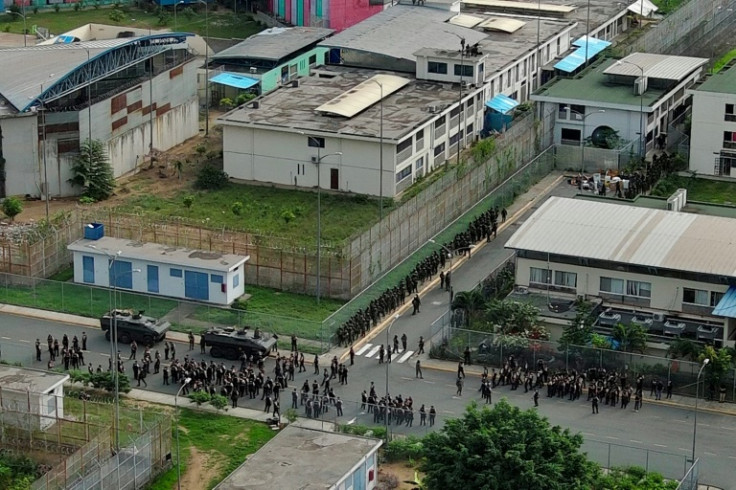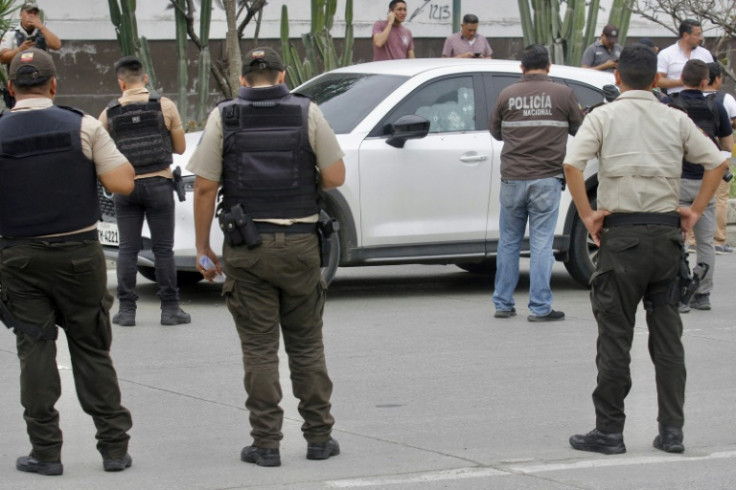Diana Salazar: Ecuador Prosecutor Rattling Narcos, Crooked Officials

Ecuador's Attorney General Diana Salazar is no fortune teller, but a few weeks before narco gangs went on a violent rampage she warned the country to brace itself.
The 42-year-old knew she had lit a fuse when she launched a wave of unprecedented raids and arrests against top officials -- from judges to a former prisons chief -- accused of shady dealings with the powerful gangs.
"The response to this operation will surely be an escalation of violence," she said in December when she unveiled the results of her "Metastasis" investigation, using a medical term describing the spread of a malignant growth.
Salazar said the case was an "X-ray of how drug trafficking has taken over state institutions," and described it as the country's largest-ever operation against corruption and drug trafficking.
The long reach of Ecuador's drug gangs into the state came under the spotlight last week after the prison escape of a notorious gang leader who appeared to have been tipped off about plans to move him to a maximum security facility.
New President Daniel Noboa imposed a state of emergency and nighttime curfew in response, but the gangs revolted, with inmates taking scores of prison staff hostage, while criminals sowed violence on the streets, leaving about 20 dead.
The burst of violence highlighted the outsized power that gangs wield in prisons in the once-peaceful country that has become a hub for the global export of Colombian and Peruvian cocaine.
Gustavo Medina, a former prosecutor, told AFP it was also a consequence of the Metastasis operation.
"It cannot be explained any other way. When authorities wanted to take action against them (the gangs), they had been duly warned to take actions to neutralize it."
Salazar launched the investigation after the prison death in 2022 of powerful drug lord Leandro Norero.
Her team scoured through chats and call logs from his cellphone, finding links to high-ranking state officials who handed out favors in exchange for money, gold, prostitutes, apartments, and other luxuries.
More than 900 people took part in the investigation, which resulted in more than 75 raids and dozens of arrests.
Since then, Salazar, the first Black woman to hold the position in Ecuador, has largely kept out of the public eye, only appearing on occasion in a bullet-proof vest or surrounded by security.
"Now, come and kill me," she taunted her enemies at a recent hearing requesting prison terms for eight suspects.
Those investigating gangs have themselves become targets and on Wednesday a prosecutor probing an attack last week on a television station was gunned down in Guayaquil.
Salazar comes from the northern Andean city of Ibarra, where local media says she was raised by a single mother of four.
She studied political science, law, and human rights, and became a prosecutor in 2011.
In 2019, she became attorney general for a six-year term, and since then she has racked up major corruption cases.
She went after former president Rafael Correa (2007-2017) who was sentenced to eight years in prison for corruption and fled to Belgium, where he has been living in exile for six years.
Critics of Salazar accuse her of focusing too much on Correa and his allies to the detriment of other key investigations, or that some of the recent arrests were politically motivated.
But others defend her.
"I would describe her as a woman with courage, talent, determination," the ex-prosecutor Medina told AFP.
Salazar also led investigations in a case called "FIFA Gate" which led to a 10-year jail term for the former president of the national football federation, Luis Chiriboga, for money laundering.
In 2021, the US State Department gave Salazar an "Anti-Corruption Champions Award," saying her "courageous actions in tackling these cases have made immense contributions to transparency and the rule of law in Ecuador."


© Copyright AFP 2024. All rights reserved.





















